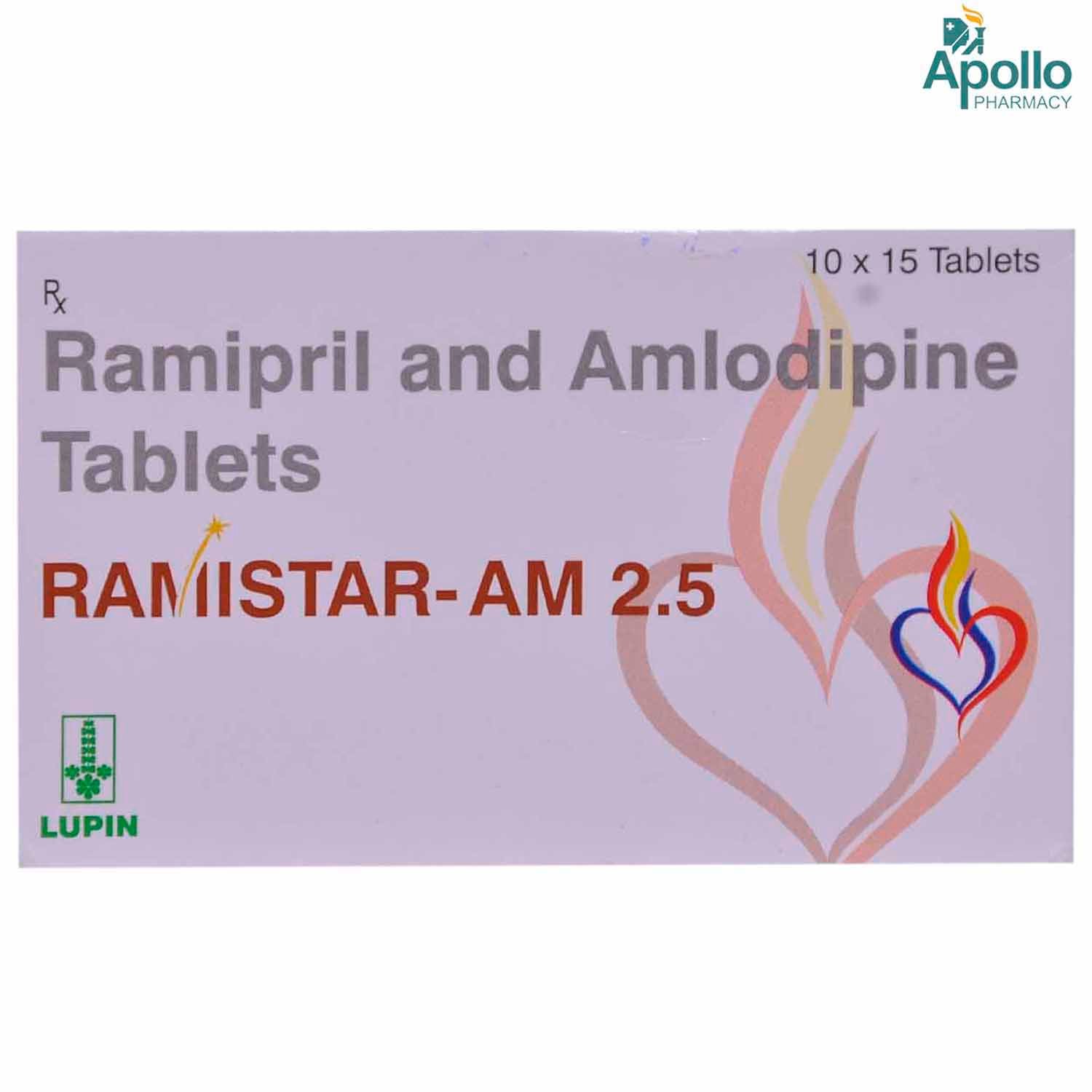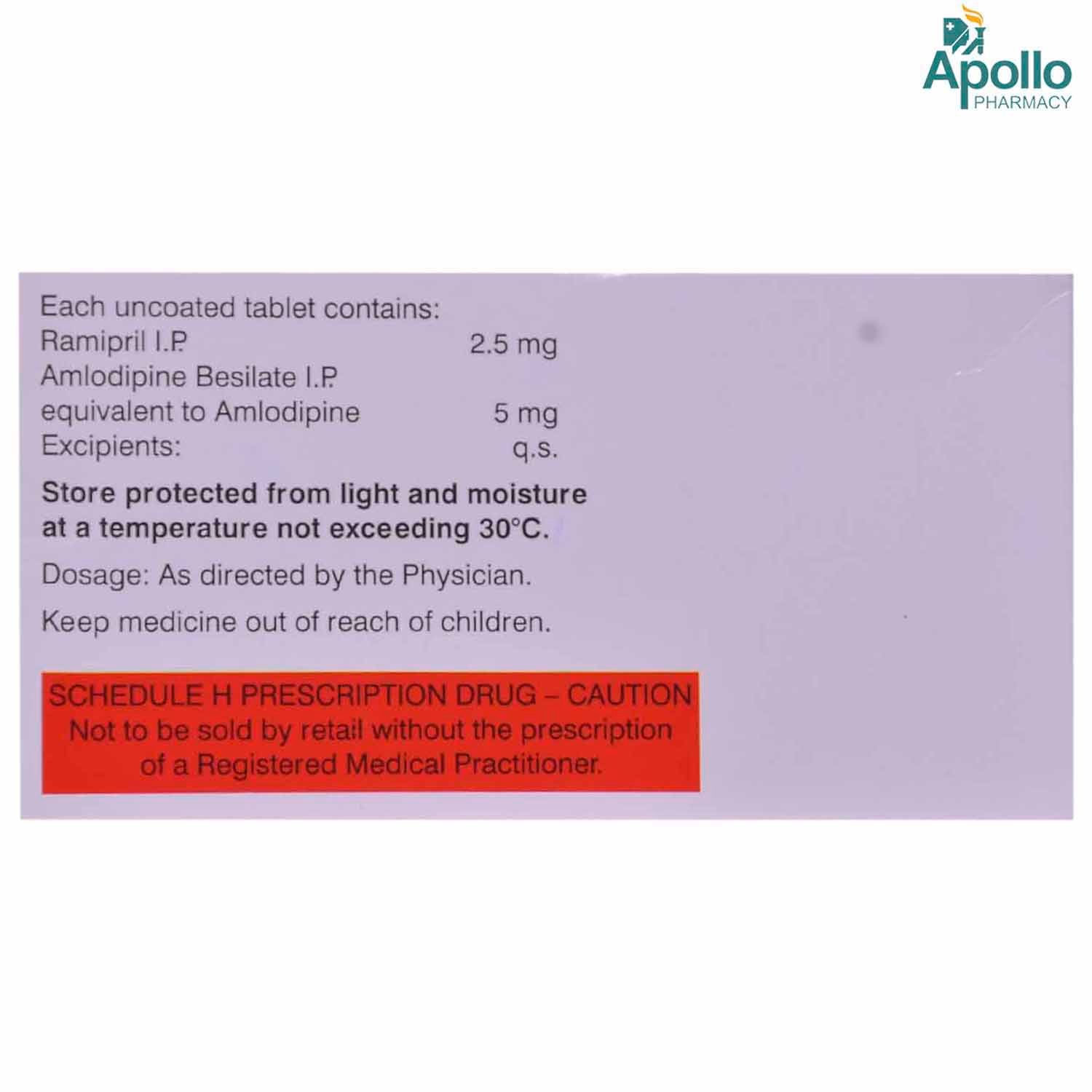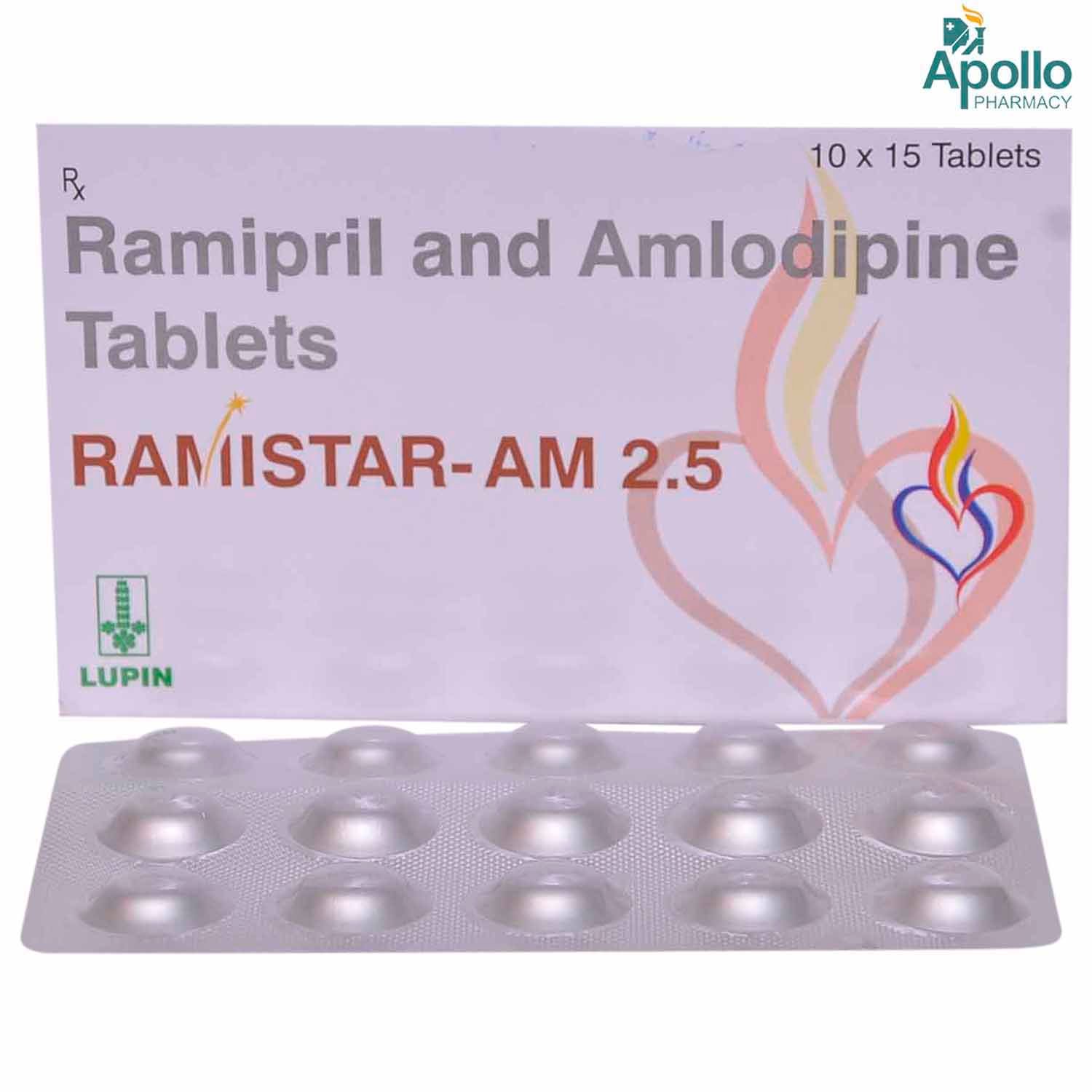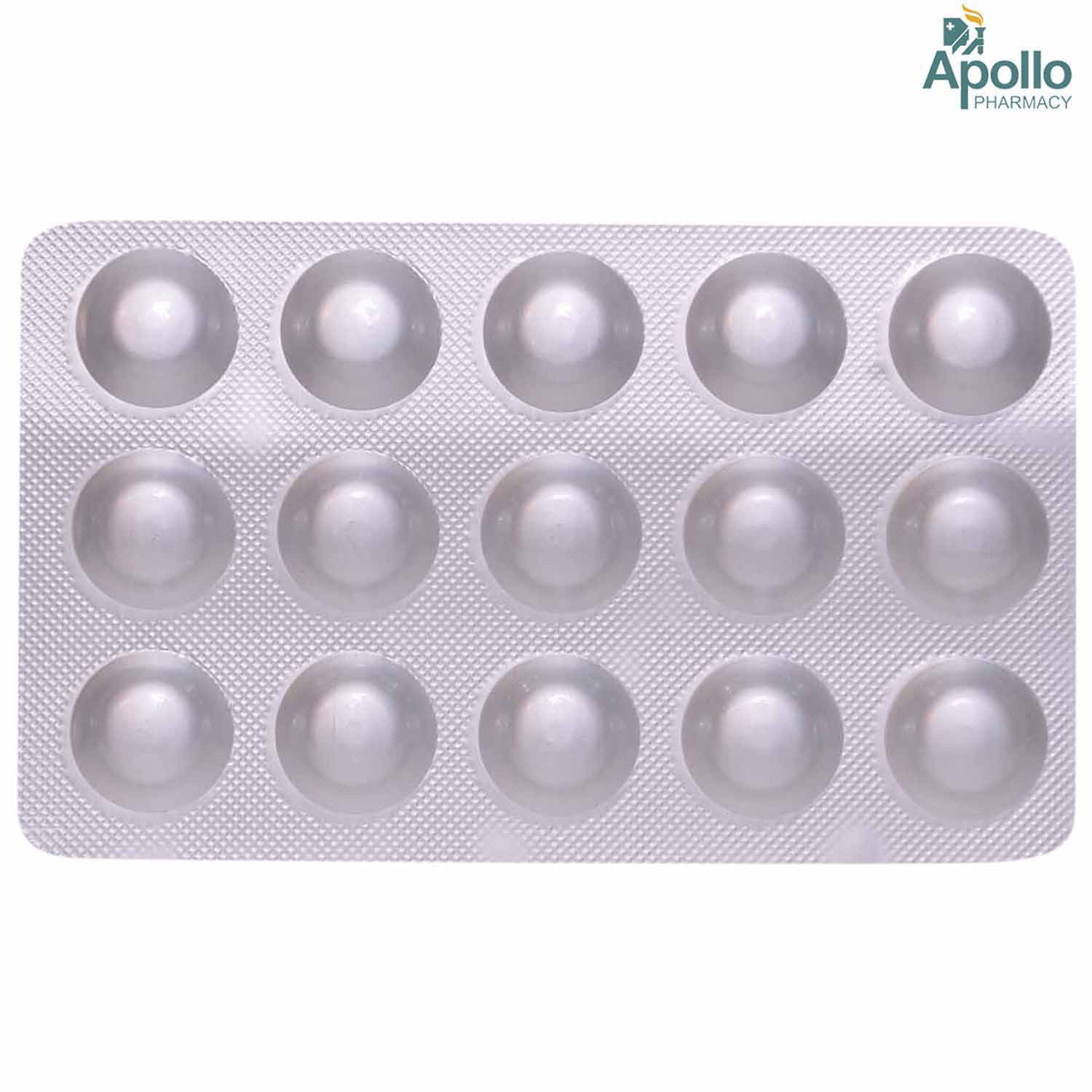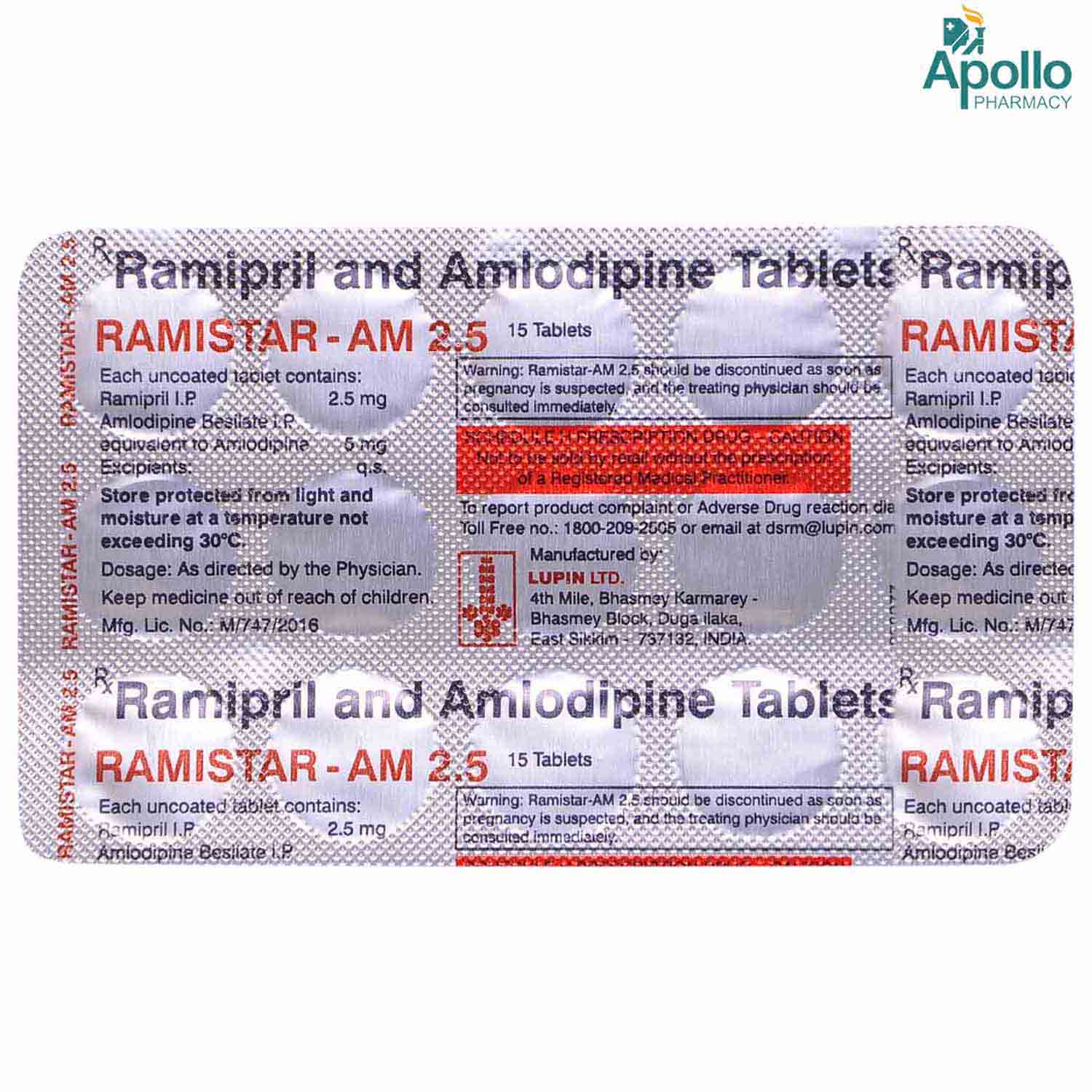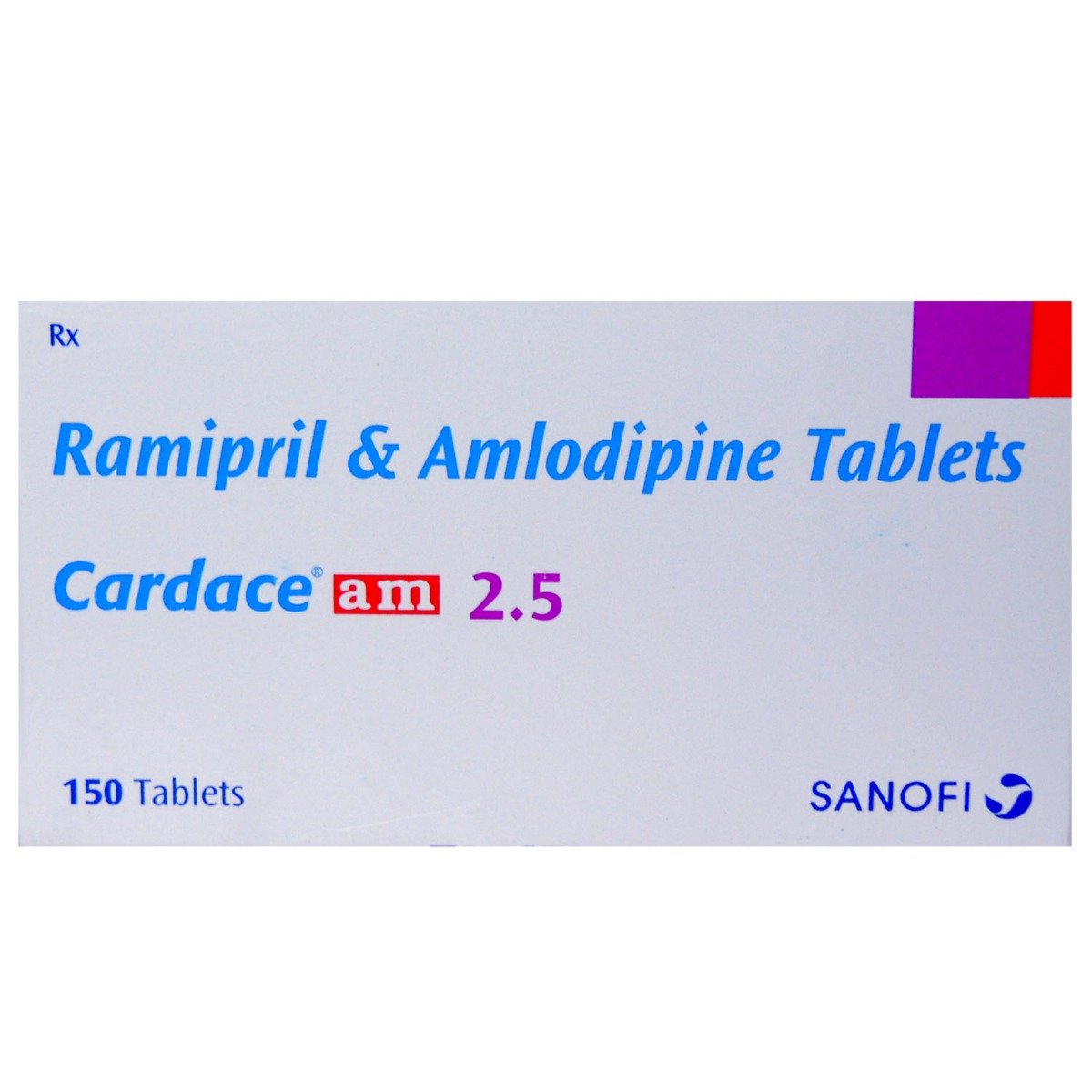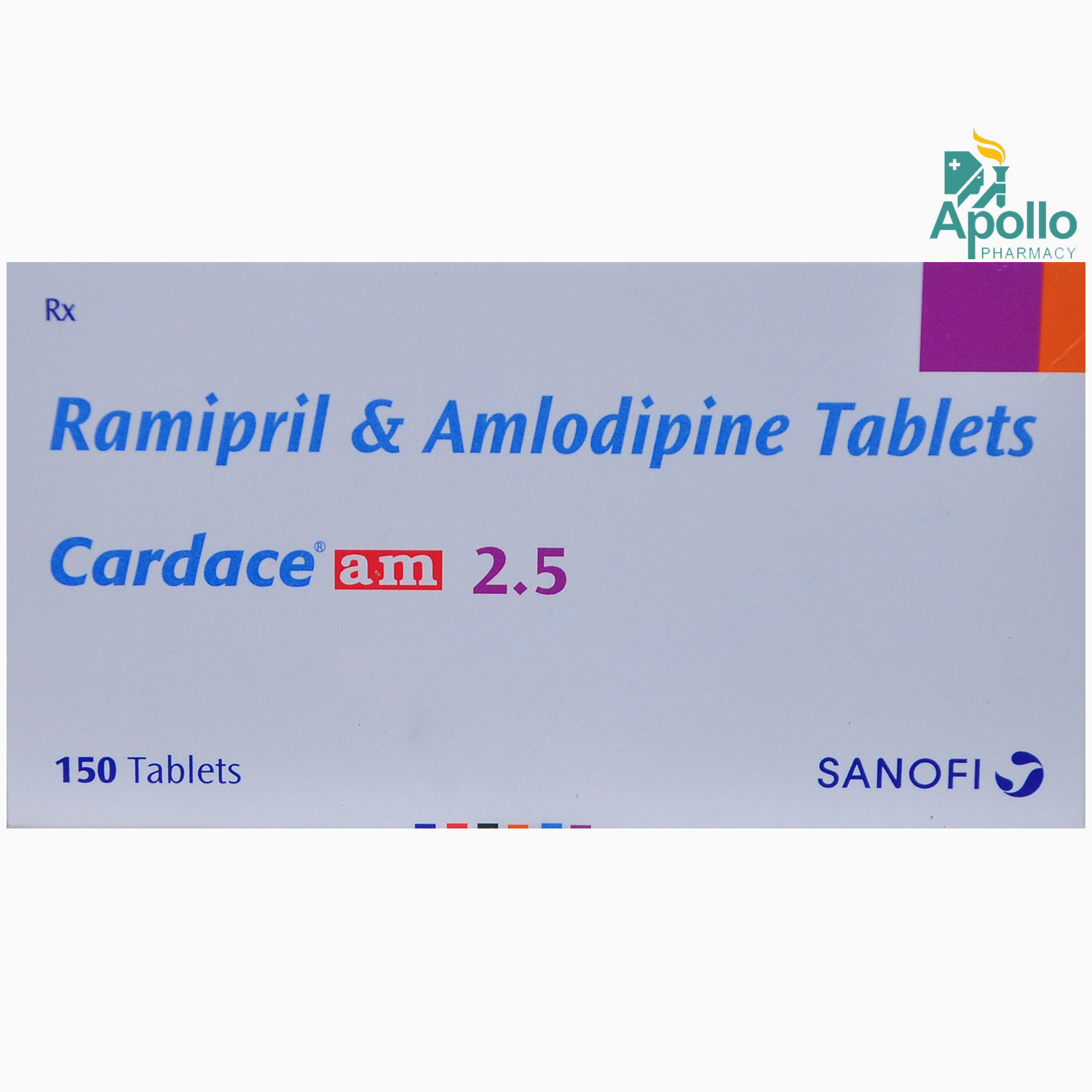Ramistar-AM 2.5 mg/5 mg Tablet 15's
MRP ₹158.5
(Inclusive of all Taxes)
₹23.8 Cashback (15%)
Provide Delivery Location
Online payment accepted
 Prescription drug
Prescription drugWhats That
Composition :
Manufacturer/Marketer :
Consume Type :
Expires on or after :
Return Policy :
About Ramistar-AM 2.5 mg/5 mg Tablet
Ramistar-AM 2.5 mg/5 mg Tablet belongs to the class of 'anti-hypertensive drugs', primarily used to treat hypertension (high blood pressure). Hypertension is a medical condition, in which the blood exerts high pressure (force exerted by circulating blood) against blood vessel's walls. This condition makes the heart to work harder in pumping the blood to the whole body. Hypertension can cause severe health complications, including stroke, heart failure, heart attack and kidney failure.
Ramistar-AM 2.5 mg/5 mg Tablet is a combination of Amlodipine (calcium channel blocker) and Ramipril (angiotensin-converting enzyme inhibitor). Amlodipine is used to treat high blood pressure, Prinzmetal's or variant angina (chest pain) and other conditions caused by coronary artery disease. It relaxes blood vessels, so that blood passes through them easily, thereby lowering the blood pressure. It also improves blood supply to the heart muscle to receive more oxygen and thus preventing chest pain. Ramipril relaxes and widens the blood vessels making it easier for the heart to pump blood throughout the body, thereby lowering blood pressure. It also decreases the body’s production of certain substances that raise blood pressure.
Your doctor will advise you how often you take Ramistar-AM 2.5 mg/5 mg Tablet based on your medical condition. In some cases, you may experience blurred vision, sweating, confusion, tiredness, stomach upset, flushing (sense of warmth in the face, ears, neck and trunk), dizziness, headache and swelling of the ankles or feet. Most of these side effects of Ramistar-AM 2.5 mg/5 mg Tablet do not require medical attention and gradually resolve over time. However, if the side effects are persistent, please reach out to your doctor.
Do not stop taking Ramistar-AM 2.5 mg/5 mg Tablet without consulting your doctor since it may worsen your condition and increase the risk of future heart problems. Regular monitoring of blood pressure, electrolyte levels and kidney functioning is advised while taking Ramistar-AM 2.5 mg/5 mg Tablet . Inform your doctor if you are suffering from kidney, liver or heart diseases. Please tell your doctor if you are taking any other medicines or have any allergic reactions to Ramistar-AM 2.5 mg/5 mg Tablet . Reducing the amount of table salt (sodium chloride) in your food often relieves the body's swelling. Let your doctor know if you use any prescription and non-prescription medications you are taking, including vitamins, before starting Ramistar-AM 2.5 mg/5 mg Tablet . If you are pregnant or breastfeeding, please tell your doctor so that the dosage of Ramistar-AM 2.5 mg/5 mg Tablet can be prescribed accordingly.
Uses of Ramistar-AM 2.5 mg/5 mg Tablet
Directions for Use
Key Benefits
Ramistar-AM 2.5 mg/5 mg Tablet consists of Amlodipine (calcium channel blocker) and Ramipril (angiotensin-converting enzyme inhibitor). Amlodipine relaxes blood vessels so that blood passes through them easily, thereby lowering blood pressure. It also treats chest pain by improving the blood supply to the heart muscle to receive more oxygen. Amlodipine also improves a person's tolerance to exercise and keeps the blood pressure at acceptable levels. Ramipril relaxes and widens the blood vessels making it easier for the heart to pump blood throughout the body, thereby lowering blood pressure.
Storage
- If you experience low blood pressure symptoms like dizziness, lightheadedness, or fainting while taking medication, seek immediate medical attention.
- Make lifestyle modifications and adjust your medication regimen under medical guidance to manage low blood pressure.
- As your doctor advises, regularly check your blood pressure at home. Record your readings to detect any changes and share them with your doctor.
- Fluid intake plays a vital role in managing blood pressure by maintaining blood volume, regulating blood pressure, and supporting blood vessel function. Drinking enough fluids helps prevent dehydration, maintain electrolyte balance, and regulate fluid balance.
- Take regular breaks to sit or lie down if you need to stand for long periods.
- When lying down, elevate your head with extra pillows to help improve blood flow.
- Avoid heavy exercise or strenuous activities that can worsen low blood pressure.
- Wear compression socks as your doctor advises to enhance blood flow, reduce oedema, and control blood pressure.
- If symptoms persist or worsen, or if you have concerns about your condition, seek medical attention for personalized guidance and care.
- Tell your doctor about the cough symptoms you're experiencing, which may be triggered by your medication.
- Your doctor may adjust your treatment plan by changing your medication, adding new medications, or providing guidance on managing your cough symptoms.
- Practice good hygiene, including frequent handwashing, avoiding close contact with others, and avoiding sharing utensils or personal items.
- Stay hydrated by drinking plenty of fluids, such as water, tea, or soup, to help thin out mucus and soothe your throat.
- Get plenty of rest and engage in stress-reducing activities to help your body recover. If your cough persists or worsens, consult your doctor for further guidance.
- Hydrate your body: Drink enough water to prevent dehydration and headaches.
- Calm Your Mind: Deep breathing and meditation can help you relax and relieve stress.
- Rest and Recharge: Sleep for 7-8 hours to reduce headache triggers.
- Take rest: lie down in a quiet, dark environment.
- Cold or warm compresses can help reduce tension.
- Stay Upright: Maintain good posture to keep symptoms from getting worse.
- To treat headaches naturally, try acupuncture or massage therapy.
- Over-the-counter pain relievers include acetaminophen and ibuprofen.
- Prescription Assistance: Speak with your doctor about more substantial drug alternatives.
- Severe Headaches: Seek emergency medical assistance for sudden, severe headaches.
- Frequent Headaches: If you get reoccurring headaches, consult your doctor.
- Headaches with Symptoms: Seek medical attention if your headaches include fever, disorientation, or weakness.
- Inform your doctor about dizziness symptoms. They may adjust your medication regimen or prescribe additional medications to manage symptoms.
- Follow your doctor's instructions for taking medication, and take it at the same time every day to minimize dizziness.
- When standing up, do so slowly and carefully to avoid sudden dizziness.
- Avoid making sudden movements, such as turning or bending quickly, which can exacerbate dizziness.
- Drink plenty of water throughout the day to stay hydrated and help alleviate dizziness symptoms.
- If you're feeling dizzy, sit or lie down and rest until the dizziness passes.
- Track when dizziness occurs and any factors that may trigger it, and share this information with your doctor to help manage symptoms.
- Inform your doctor about the nausea and discuss possible alternatives to the medication or adjustments to the dosage.
- Divide your daily food intake into smaller, more frequent meals to reduce nausea.
- Opt for bland, easily digestible foods like crackers, toast, plain rice, bananas, and applesauce.
- Avoid certain foods that can trigger nausea, such as fatty, greasy, spicy, and smelly foods.
- Drink plenty of fluids, such as water, clear broth, or electrolyte-rich beverages like coconut water or sports drinks.
- Use ginger (tea, ale, or candies) to help relieve nausea.
- Get adequate rest and also avoid strenuous activities that can worsen nausea.
- Talk to your doctor about taking anti-nausea medication if your nausea is severe.
- Record when your nausea occurs, what triggers it, and what provides relief to help you identify patterns and manage your symptoms more effectively.
- Preventing Vomiting (Before it Happens)
- Take medication exactly as prescribed by your doctor. This can help minimize side effects, including vomiting.
- Having a small meal before taking your medication can help reduce nausea and vomiting.
- Talk to your doctor about taking anti-nausea medication along with your prescribed medication.
- Managing Vomiting (If it Happens)
- Try taking ginger in the form of tea, ale, or candy to help alleviate nausea and vomiting.
- What to Do if Vomiting Persists
- Consult your doctor if vomiting continues or worsens, consult the doctor for guidance on adjusting your medication or additional treatment.
- Inform your doctor about dizziness symptoms. They may adjust your medication regimen or prescribe additional medications to manage symptoms.
- Follow your doctor's instructions for taking medication, and take it at the same time every day to minimize dizziness.
- When standing up, do so slowly and carefully to avoid sudden dizziness.
- Avoid making sudden movements, such as turning or bending quickly, which can exacerbate dizziness.
- Drink plenty of water throughout the day to stay hydrated and help alleviate dizziness symptoms.
- If you're feeling dizzy, sit or lie down and rest until the dizziness passes.
- Track when dizziness occurs and any factors that may trigger it, and share this information with your doctor to help manage symptoms.
Drug Warnings
Do not use Ramistar-AM 2.5 mg/5 mg Tablet if you are allergic to Ramistar-AM 2.5 mg/5 mg Tablet or any of its components. Please inform your doctor if you are using any prescription and non-prescription medications you are taking, including vitamins, before starting Ramistar-AM 2.5 mg/5 mg Tablet . Let your doctor know if you have any history of severe heart, kidney or liver diseases, high potassium levels (hyperkalaemia), bone marrow suppression, and aortic stenosis (heart valve problem). Please consult your doctor if you plan to conceive, are pregnant, or are a breastfeeding mother before using Ramistar-AM 2.5 mg/5 mg Tablet . Ramistar-AM 2.5 mg/5 mg Tablet can increase the chances of light-headedness so rise slowly if you are sitting/lying and avoid operating any machine or doing any work that needs mental alertness.
Drug-Drug Interactions
Drug-Drug Interactions
Login/Sign Up
Using Ramistar-AM 2.5 mg/5 mg Tablet together with dantrolene may increase the risk of hyperkalemia (high blood potassium).
How to manage the interaction:
Taking Ramistar-AM 2.5 mg/5 mg Tablet with Dantrolene can cause an interaction, consult a doctor before taking it. You should seek medical attention if you experience nausea, vomiting, weakness, confusion, tingling of the hands and feet, a weak pulse, or a slow or irregular heartbeat. Do not stop using any medications without talking to a doctor.
Taking aliskiren together with Ramistar-AM 2.5 mg/5 mg Tablet may increase the risk of serious side effects such as kidney problems, low blood pressure, and high potassium levels in the blood. High levels of potassium can develop into a condition known as hyperkalemia, which in severe cases can lead to kidney problems, muscle paralysis and irregular heart rhythm.
How to manage the interaction:
Taking Ramistar-AM 2.5 mg/5 mg Tablet with Aliskiren is not recommended, but can be taken if prescribed by a doctor. However, consult your doctor if you feel nausea, vomiting, weakness, confusion, tingling in the hands and feet, a sensation of heaviness in the legs, a weak pulse, or a slow or irregular heartbeat. You must drink enough fluids while taking these medications. It is advised to reduce the intake of foods high in potassium, including tomatoes, raisins, figs, potatoes, lima beans, bananas, plantains, papayas, pears, cantaloupes, mangoes. Do not discontinue any medications without a doctor's advice.
Using Ramistar-AM 2.5 mg/5 mg Tablet and mitotane together may drastically lower Ramistar-AM 2.5 mg/5 mg Tablet blood levels, which makes the medicine less effective.
How to manage the interaction:
Although co-administration of Ramistar-AM 2.5 mg/5 mg Tablet with mitotane can result in an interaction, it can be taken if a doctor has advised it. Do not discontinue any medications without consulting a doctor.
Using phenobarbital and Ramistar-AM 2.5 mg/5 mg Tablet may drastically lower Ramistar-AM 2.5 mg/5 mg Tablet blood levels, which makes the medicine less effective.
How to manage the interaction:
Although co-administration of phenobarbital with Ramistar-AM 2.5 mg/5 mg Tablet can result in an interaction, it can be taken if a doctor has advised it. Do not discontinue any medications without consulting a doctor.
Coadministration of Ramistar-AM 2.5 mg/5 mg Tablet and carbamazepine together may significantly reduce Ramistar-AM 2.5 mg/5 mg Tablet blood levels, making the medicine less effective.
How to manage the interaction:
Although there is an interaction between Ramistar-AM 2.5 mg/5 mg Tablet with carbamazepine, it can be taken if a doctor has advised it. However, if you experience any unusual symptoms contact the doctor immediately. Do not stop using any medications without talking to a doctor.
Using Ramistar-AM 2.5 mg/5 mg Tablet and phenytoin together may drastically lower Ramistar-AM 2.5 mg/5 mg Tablet blood levels, which makes the medicine less effective.
How to manage the interaction:
Although Ramistar-AM 2.5 mg/5 mg Tablet with phenytoin can result in an interaction, it can be taken if a doctor has advised it. Do not discontinue any medications without consulting a doctor.
Using Ramistar-AM 2.5 mg/5 mg Tablet and primidone together may lower Ramistar-AM 2.5 mg/5 mg Tablet blood levels, which makes the medicine less effective.
How to manage the interaction:
Although co-administration of Ramistar-AM 2.5 mg/5 mg Tablet with primidone can result in an interaction, it can be taken if a doctor has advised it. Do not discontinue any medications without consulting a doctor.
Coadministration of lemborexant and Ramistar-AM 2.5 mg/5 mg Tablet may increase the blood levels of lemborexant.
How to manage the interaction:
Although co-administration of Ramistar-AM 2.5 mg/5 mg Tablet with Lemborexant can result in an interaction, it can be taken if a doctor has advised it. However, consult your doctor if you experience abnormal sleep patterns, worsening of depression, changes in heartbeat, or headache. Do not discontinue any medications without consulting a doctor.
Taking simvastatin with Ramistar-AM 2.5 mg/5 mg Tablet may result in considerably higher blood levels of simvastatin and may increase the risk of side effects (liver damage and rhabdomyolysis - an uncommon but serious illness characterized by the breakdown of skeletal muscle tissue).
How to manage the interaction:
Although taking Ramistar-AM 2.5 mg/5 mg Tablet with simvastatin can result in an interaction, it can be taken if a doctor has advised it. If you have unexplained muscular pain, soreness, or weakness while using simvastatin, especially if these symptoms are accompanied by fever or dark-colored urine, consult the doctor immediately. However, if you develop a fever, chills, joint pain or swelling, unusual bleeding or bruising, skin rash, itching, loss of appetite, fatigue, nausea, vomiting, dark colored urine, and/or yellowing of the skin or eyes, consult the doctor. Do not stop using any medications without a doctor's advice.
Co-administration of Ramistar-AM 2.5 mg/5 mg Tablet can make Sirolimus may increase the risk of angioedema (a condition associated with swelling of the face, eyes, lips, tongue, throat, and occasionally also the hands and feet).
How to manage the interaction:
There may be a possibility of interaction between Ramistar-AM 2.5 mg/5 mg Tablet and Sirolimus, but it can be taken if prescribed by a doctor. However, consult the doctor if you notice any swelling of the face, eyes, lips, tongue, throat, hands and feet or have trouble breathing or swallowing. Do not stop using any medications without a doctor's advice.
Drug-Food Interactions
Drug-Food Interactions
Login/Sign Up
Lentils, Orange Juice, Oranges, Raisins, Potatoes, Salmon Dried, Spinach, Sweet Potatoes, Tomatoes, Coconut Water, Beans, Beetroot, Broccoli, Bananas, Apricots, Avocado, Yogurt
How to manage the interaction:
Taking Ramistar-AM 2.5 mg/5 mg Tablet with potassium-containing salt substitutes or potassium supplements can cause high levels of potassium in the blood. Avoid taking potassium-containing salt substitutes or potassium supplements while being treated with Ramistar-AM 2.5 mg/5 mg Tablet.
Diet & Lifestyle Advise
- Keep your weight under control with body mass index (BMI) between 19.5 and 24.9.
- Do regular physical activity or exercise for at least 150 minutes per week or about 30 minutes most days of the week. Doing this can help you to lower your raised blood pressure by about 5 mm of Hg.
- Limit sodium chloride intake (table salt) in your daily diet to 2300 mg per day or less than 1500 mg is ideal for most adults.
- If you are taking alcohol, use only one serving for women and two servings for men.
- Quit smoking to lower the risk of heart diseases.
- Avoid chronic stress as it can raise your blood pressure. Try to enjoy and spent time with your loved ones to cope with stress.
- Monitor your blood pressure daily, and if you notice any fluctuations frequently, please contact your doctor immediately.
- Try including heart-healthy omega 3 fatty acid-containing foods in your daily diet. You can also use low-fat cooking oils like olive oil, soybean oil, canola oil and coconut oil to lower your elevated blood pressure.
Side Effects of Ramistar-AM 2.5 mg/5 mg Tablet
- Blurred vision
- Sweating
- Confusion
- Tiredness
- Stomach upset
- Flushing (sense of warmth in the face, ears, neck and trunk)
- Dizziness
- Headache
- Swelling of the ankles or feet
Habit Forming
Therapeutic Class
All Substitutes & Brand Comparisons
RX
Out of StockHopecard AM Tablet 10's
Aristo Pharmaceuticals Pvt Ltd
₹37.9
(₹3.41 per unit)
64% CHEAPERRX
Out of StockRIMARK-AM 5MG/2.5MG TABLET
Lanark Laboratories Pvt Ltd
₹48
(₹4.32 per unit)
54% CHEAPERRX
Out of StockRAMZE-AM 5MG/2.5MG TABLET
₹72
(₹4.32 per unit)
54% CHEAPER
Author Details
We provide you with authentic, trustworthy and relevant information
Drug-Diseases Interactions
Drug-Diseases Interactions
Login/Sign Up
FAQs
Ramistar-AM 2.5 mg/5 mg Tablet consists of Amlodipine and Ramipril. Amlodipine relaxes blood vessels, so that blood passes through them easily thereby lowering the blood pressure. Ramipril relaxes and widens the blood vessels making it easier for the heart to pump blood throughout the body thereby lowering the raised blood pressure.
Ramistar-AM 2.5 mg/5 mg Tablet is recommended to use in dose and duration as advised by the doctor. Do not stop taking Ramistar-AM 2.5 mg/5 mg Tablet on your own as it may lead to a sudden rise in blood pressure increases the risk of heart attack and stroke.
Ramistar-AM 2.5 mg/5 mg Tablet can cause dizziness as one of its side effects. If you feel dizzy, try getting up slowly from a sitting or lying position. If your dizziness is severe or unmanageable, please seek medical advice.
Amlodipine in Ramistar-AM 2.5 mg/5 mg Tablet can cause ankle swelling upon long term use. Please try to keep your feet at the elevated position when sitting for long hours. If the problem persists, please consult your doctor and do as advised.
Ramistar-AM 2.5 mg/5 mg Tablet may increase blood potassium levels in people with diabetes, poor kidney function and patients using potassium-sparing diuretics or taking potassium supplements. Please consult your doctor before taking Ramistar-AM 2.5 mg/5 mg Tablet if you have diabetes.
Even though your blood pressure becomes normal after using Ramistar-AM 2.5 mg/5 mg Tablet , it may switch back to high ranges if you stop using it. Your doctor may change the dosing schedule based on your blood pressure range.
Take the missed dose as soon as possible. However, if it is time for the next dose, skip the missed dose and go back to your regular dosing schedule.
Drug-Drug Interactions Checker List
- SIMVASTATIN
- PREDNISOLONE
- IBUPROFEN
- NAPROXEN
- RAMIPRIL
- METOPROLOL
- BENDROFLUMETHIAZIDE
- SILDENAFIL
- ALLOPURINOL
- INSULIN GLARGINE
- METFORMIN
- SITAGLIPTIN
- FUROSEMIDE
- PREGABALIN
Special Advise
- Monitor your blood pressure regularly and seek medical advice if you notice any drastic fluctuations.
- Ramistar-AM 2.5 mg/5 mg Tablet may affect patients with hepatic impairment, and hence it is used cautiously, and Liver function monitoring and Liver Function Tests are advised to monitor the liver enzyme changes.
- Your doctor may advise you to get a regular kidney function test, blood examinations for potassium levels and other electrolytes while using Ramistar-AM 2.5 mg/5 mg Tablet to rule out any renal impairment.
Disease/Condition Glossary
Hypertension: It is a chronic condition when blood pressure is too high. Blood pressure is defined as the amount of blood pumped by the heart and the amount of resistance exerted by the arteries against the blood flow. If the heart pumps more blood, then arteries become narrower and in turn, blood pressure becomes high. If blood pressure becomes uncontrolled, it may lead to serious heart diseases, including stroke and heart attack. Additionally, high blood pressure can also cause brain damage (stroke) and kidney failure. Blood pressure is expressed as systolic and diastolic pressures. Systolic blood pressure represents the contraction and relaxation of the heart. Diastolic pressure is exerted in the blood vessels when the heart beats and is in the resting state. Ideal blood pressure should be between 90/60mmHg and 120/80mmHg. Hypertension is detected when systolic blood pressure is more than 140mmHg, and diastolic pressure is higher than 90mmHg. Some of the symptoms of hypertension include headache, nose bleed, vomiting and chest pain.

Have a query?
Alcohol
Safe if prescribed
Alcohol may lower your blood pressure. It would help if you avoided or limit consuming alcohol.
Pregnancy
Consult your doctor
It is advised to seek medical advice before using Ramistar-AM 2.5 mg/5 mg Tablet if you plan to conceive or a pregnant before using Ramistar-AM 2.5 mg/5 mg Tablet .
Breast Feeding
Consult your doctor
There are limited studies on how Ramistar-AM 2.5 mg/5 mg Tablet affects breastfed infants. Please consult your doctor before using Ramistar-AM 2.5 mg/5 mg Tablet if you are a lactating mother.
Driving
Safe if prescribed
Ramistar-AM 2.5 mg/5 mg Tablet may cause side effects due to lowering of the blood pressure such as dizziness or tiredness. If you feel dizzy or tired when taking this medicine, do not drive or use any tools or machines.
Liver
Consult your doctor
Let your doctor know if you have any history of liver diseases before using Ramistar-AM 2.5 mg/5 mg Tablet . Ramistar-AM 2.5 mg/5 mg Tablet is to be administered with caution in patients with severe hepatic impairment.
Kidney
Consult your doctor
Let your doctor know if you have any history of kidney diseases before using Ramistar-AM 2.5 mg/5 mg Tablet . Ramistar-AM 2.5 mg/5 mg Tablet is primarily eliminated by the kidney and can be accumulated in patients with renal impairment.
Children
Safe if prescribed
Ramistar-AM 2.5 mg/5 mg Tablet is not recommended for use in children as the efficacy and safety has not been established.
Recommended for a 30-day course: 2 Strips

